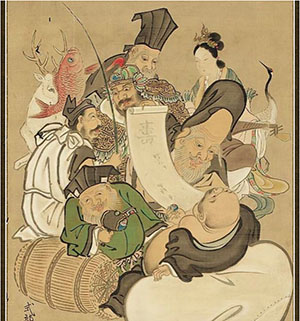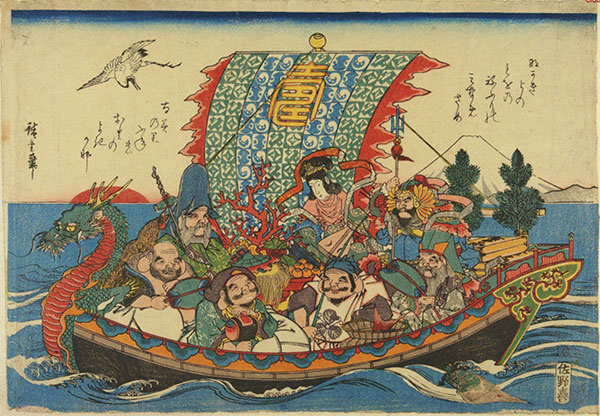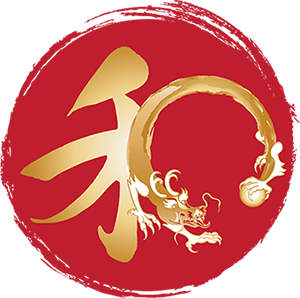READING TIME: 5 MINUTES.
“Sometimes what you are looking for is right in front of you and you don’t even know.” – John Hall.
In the last two months, with the pandemic changing our daily routines and restricting our activities, one of the things I have been enjoying greatly is hopping on my cross-bike and exploring the area where I live. I love visiting shrines and temples so I started looking for interesting new places to visit on my cycling adventures. To my amazement the area is a real temple ‘box of treasures’: it is abounding in temples with centuries of history and beautiful gardens that delighted the senses and recharged my energy. I also learned more about the traditions in my area than I had in the last decade – I believe the quote above may have been made for me!
One of my discoveries was a pilgrimage to the Seven Gods of Fortune (Shichi-Fuku-Jin) in the nearby city of Hino. I knew about the deities because they are an important part of Japanese mythology – their images can be seen on artworks, on good luck charms and on netsuke figurines. I have been to several shrines dedicated to them too. It is believed that each god carries a specific gift meant to contribute to our good fortune and wellbeing. So, let me introduce the Seven Gods of Fortune and what their gifts are.
Who are the Seven Gods Of Fortune?
In Japanese mythology, the Seven Gods of Fortune are believed to grant good luck and are often depicted as happy, laughing group of deities sailing on their Takara-bune (treasure ship in Japanese.) The ship has a dragon head on its kiln and is accompanied by a turtle and a crane – both auspicious symbols of wisdom and longevity.
It is known that these deities have their origins in ancient gods of fortune: Benzaiten, Bishamonten, Daikokuten come from Hinduism; Fukurokuju, Hotei, Jurojin come from Chinese Taoism and Ebisu is the only one who has a Japanese ancestry. They have been worshipped for centuries and their gifts combined were seen as bestowing the recipient with the perfect virtues: longevity, fortune, popularity, sincerity, kindness, dignity, and magnanimity. Here are the Seven Gods:
 Ebisu is a god of fishermen and wealth. He has a portly figure, large swollen earlobes, and he usually has a fishing rod in his right hand while in his left is a large, freshly caught fish – a tai (sea bream), itself a symbol of good luck. Perhaps due to his successful catch, Ebisu is always smiling. Ebisu’s gift is wealth and good luck.
Ebisu is a god of fishermen and wealth. He has a portly figure, large swollen earlobes, and he usually has a fishing rod in his right hand while in his left is a large, freshly caught fish – a tai (sea bream), itself a symbol of good luck. Perhaps due to his successful catch, Ebisu is always smiling. Ebisu’s gift is wealth and good luck.
Daikokuten is a god of wealth and commerce, and also a household deity. He originally is the Indian deity Shiva. In his right hand he carries the hammer of riches which can grant wishes and has a large bag of treasures slung over his shoulder.
Benzaiten (Benten) is a goddess of everything that flows, including water, music and art. She is the only female deity among the Seven Gods of Fortune and is the embodiment of creativity and femininity.
Hotei used to be monk in China. He is a god of abundance and joy. He has a big belly and is usually laughing.
Bishamonten is the god of fortune in war and battles, also associated with authority and dignity. He is the protector of those who live in righteousness. He also acts as the protector of holy sites and important places and holds a spear in his right hand to fight against the evil spirits. He is usually depicted in illustrations with a hoop of fire which shows his Hindu origins (Vaiśravaṇa in Sanskrit.)
Juroujin is of Chinese origin and is the god of longevity. It is said he was a real person who lived in ancient times. He is often represented as a tall figure with a very long beard riding a deer and is accompanied by a 1500 year old crane and a turtle, as symbols of his affinity to longevity.
Fukurokuju is also of Chinese origin. He is considered to have once been a mortal and lived as Taoist sage and is the god of wisdom and longevity. He is often depicted as short in height but with a very high forehead and is usually to be found in the company of a stork or crane.
Prosperity, joy, dignity, longevity, love, creativity, success – as you can see the Seven Gods have some powerful gifts to bestow. And while the gods themselves may be the stuff of myth and legends, the essences behind their gifts are very real. For hundreds of years people praying at their shrines have reached for these essences and through that have created energetic pathways to them that we can utilize today. This inspired me to make the pilgrimage myself and as I do I will post videos for you to see what the sites are like and even experience their energy through the medium of the video.
* The Spirit of Japan Tours organizes private and group tours to temples and sites where you can experience the richness of Japan’s spirituality and traditions. Please, message us for more information about our future tours.



